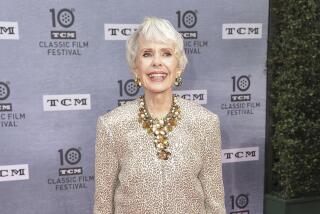Co-founder of minority redevelopment course
Barbara S. Harris, a property manager who co-founded the Ross Minority Program in Real Estate at USC, which trains students in the redevelopment of minority communities, has died. She was 80.
Harris died Aug. 26 at her home in Thousand Oaks, her son, Michael, said. The cause was mesothelioma, a form of cancer associated with the inhalation of asbestos particles.
She had been working in property management for more than 30 years when the Los Angeles riots of 1992 left devastated areas of the city in need of rebuilding. She and other real estate executives and leaders of the Los Angeles Community Redevelopment Agency worked with USC to launch the Ross Minority Program in Real Estate, a two-week intensive course for college graduates interested in a career in urban redevelopment.
“Barbara recognized that real estate development is foundational for community development,” Raphael Bostic, associate director of the USC Lusk Center for Real Estate, told The Times last week.
More than 650 people have graduated from the program.
“Barbara cared tremendously about Los Angeles and had a passion for the Ross program,” said Richard C. Gibson, a real estate developer who graduated from the program in 2002. “Without her, it never would have happened. She was the driving force.”
Harris was born Barbara Seger on Nov. 15, 1927, in Earlville, Iowa. She enrolled in Coe College in Cedar Rapids, Iowa, in 1945 but dropped out after two years to attend the acting school of the Goodman Theatre in Chicago for four years. While she was there she met and married actor and singer Dale Harris.
The couple soon moved to Los Angeles, where she performed in neighborhood theater productions. In the early 1950s she became a property manager for a public housing project in the San Fernando Valley. She then began managing apartment buildings, medical centers and, finally, high-rise office buildings.
Her interest in drama segued into creative writing. She wrote a science fiction novel, “Who Is Julia?” that was published in 1972. The plot turns on the accidental death of a beautiful woman whose brain is transplanted into the body of a plain-looking woman who has been declared brain dead.
“It is a fascinating exploration of the scientific, social and psychological consequences” of a brain transplant, wrote Digby Diehl in a 1972 review for The Times. The novel was made into a TV movie in 1986.
“For my mom, the story was a compelling idea about women’s identity in the 1970s,” Michael Harris said. “She was breaking barriers as a woman executive at the time.”
In recent years Harris had worked as chief operating officer of Murdock Management Co. and then director of marketing with City Centre Development.
Harris is survived by her husband, son and a brother, Robert B. Seger of Bel Air, Md.
Contributions in her name can be made to the Mesothelioma Applied Research Foundation, P.O. Box 91840, Santa Barbara, CA 93190-1840 or at www.marf.org.
--
More to Read
Sign up for Essential California
The most important California stories and recommendations in your inbox every morning.
You may occasionally receive promotional content from the Los Angeles Times.










